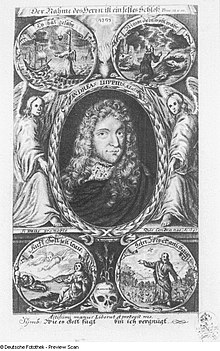Andreas Luppius
Andreas Luppius (actually Luppe ; born December 19, 1654 in Groß Kyhna ; † 1731 ) was a pietistic and mystical German publisher , bookseller and engraver . Its importance lies particularly in the early dissemination of Pietist works in Europe.
Life
Andreas Luppius was born on December 19, 1654 in Groß Kyhna as the son of pastor Gregorius Luppe and his wife Susanne, née. Fischer was born as Andreas Luppe - but he preferred the Latinized spelling Luppius of his name. The Leipzig chief town clerk and syndic Gregorius Luppe was his grandfather. After studying at the University of Leipzig , Luppius worked as a bookseller in Nijmegen , from where he expanded to Wesel , Duisburg , Amsterdam and Frankfurt am Main , and later to Dresden , Leipzig , Halle an der Saale and Berlin . The publishing of pietistic works enabled him a career at the court of Queen Sophie Charlotte of Prussia , who appointed him in 1703 as court printer, engraver, art and bookseller; later he was also named director of the Royal Art Academy Lützenburg and mayor of Lützenburg. However, after a dubious marriage affair, he fell from grace and was dropped. After an arrest two years later and several unsuccessful requests for the privilege of his printing house, his situation deteriorated, he was forced to sell his houses and died defeated in 1731.
Andreas Luppius published writings by Jean de Labadie , Theophrastus Paracelsus , Johann Tauler , Jakob Böhme and Philipp Jacob Spener , among others . He also published astrological and kabbalistic literature, and in 1686 a new edition of the magic book Arbatel . In 1700 he published the first Pietistic hymn books. Among his copperplate engravings, the first edition of the Leibniz engraving by Martin Bernigeroth as well as the publishing of engravings by August Hermann Francke , Jakob Böhme , Paracelsus , Quirinus Kuhlmann , Joachim Justus Breithaupt , Martin Luther and Philipp Melanchton are particularly relevant.
He was a friend of Philipp Jacob Spener and Quirinus Kuhlmann ; However, his character, described as hot-headed and unsteady, prevented long friendships, so that there were several rifts. He wrote some poems on Gottfried Wilhelm Leibniz .
literature
- Reinhard Breymayer : The "royal instrument". A religiously motivated metrological utopia with Andreas Luppius (1686), its roots with the early rose cruiser 'Simon Studion' (1596) and its aftermath with the theosophist Friedrich Christoph Oetinger (1776). With the neglected fragment of a letter from Johannes Kepler . In: Perceiving the Other. Contributions to European history. Dedicated to August Nitschke on the occasion of his 65th birthday . Edited by Martin Kintzinger, Wolfgang Stürner, Johannes Zahlten. Cologne, Weimar, Vienna: Böhlau Verlag 1991 [published 1992], pp. 509-532.
- Eberhard Kulf: The Marbach Latin school teacher Simon Studion (1543-16?) And the beginnings of Württemberg archeology , in: Ludwigsburger Geschichtsblätter 42 (1988).
- Suvi-Päivi Koski: The bookseller Andreas Luppius and the hymn books published by him , pages 216–232 in: Yearbook for Liturgy and Hymnology, 1999
- Kurt Müller and Gisela Krönert: Life and Work of Gottfried Wilhelm Leibniz . Klostermann, Frankfurt am Main 1969
- L. u .: Luppius, Andreas . In: Allgemeine Deutsche Biographie (ADB). Volume 19, Duncker & Humblot, Leipzig 1884, p. 650 f.
| personal data | |
|---|---|
| SURNAME | Luppius, Andreas |
| ALTERNATIVE NAMES | Luppe, Andreas (maiden name) |
| BRIEF DESCRIPTION | German publisher and bookseller |
| DATE OF BIRTH | December 19, 1654 |
| PLACE OF BIRTH | Great Kyhna |
| DATE OF DEATH | 1731 |
